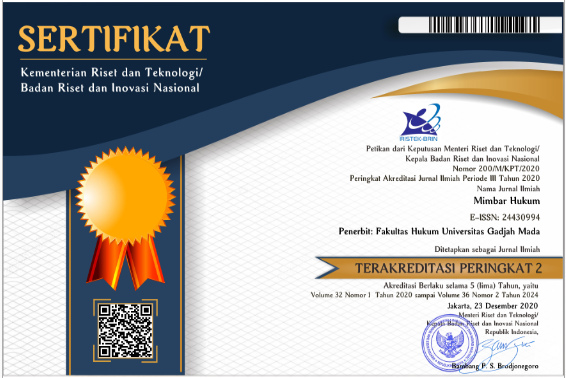LEGAL POLITICS OF WATER RESOURCES MANAGEMENT IN INDONESIA: ENVIRONMENTAL PERSPECTIVE
Nadia Astriani(1*)
(1) Universitas Padjadjaran
(*) Corresponding Author
Abstract
Abstract
Water is a vital component in the life of all living things. Because water is very important for the life of all living creatures, it takes the rules, both in the form of legislation and norms and traditions of society, so that the benefits can be felt by all parties. This article will discuss the legal politics of water resources management in Indonesia from the perspective of environmental law. The research method used in this research is normative juridical research method. The results of the study explain that the legal politics of water resources management in Indonesia places the State as the ruler of water resources. In its utilization, this water resource is used as much as possible for the people's prosperity. In practice, the state divides its management authority to private parties, thus causing water privatization. This condition shows anthropocentric views still dominate the regulation of water resources. This view is contrary to the ecocentric point of view adopted by environmental law, where water is viewed as an entity that has a certain value, so that in utilizing it should not reduce the value of the water itself.
Intisari
Air merupakan komponen vital dalam kehidupan seluruh mahluk hidup. Karena air sangat penting bagi kehidupan seluruh mahluk hidup, maka dibutuhkan aturan, baik berupa perundang-undangan maupun norma dan tradisi masyarakat, agar manfaatnya dapat dirasakan semua pihak. Artikel ini akan membahas mengenai politik hukum pengelolaan sumber daya air di Indonesia dari perspektif hukum lingkungan. Metode penelitian yang digunakan pada penelitian ini adalah meode penelitian yuridis normatif . Hasil penelitian menjelaskan bahwa politik hukum pengelolaan sumber daya air di Indonesia menempatkan Negara sebagai penguasa sumber daya air. Dalam pemanfaatannya, sumber daya air ini digunakan sebesar-besarnya untuk kemakmuran rakyat. Pada prakteknya negara membagi kewenangan pengelolaannya kepada pihak swasta, sehingga menyebabkan privatisasi air. Kondisi ini memperlihatkan pandangan antroposentris masih mendominasi pengaturan sumber daya air. Pandangan ini bertentangan dengan cara pandang ekosentris yang dianut hukum lingkungan, dimana air dipandang sebagai entitas yang memiliki nilai tertentu, sehingga dalam memanfaatkannya tidak boleh mengurangi nilai air itu sendiri.
Keywords
Full Text:
PDFReferences
A. Books
Bram, Deni, 2014, Politik Hukum Pengelolaan Lingkungan Hidup, Setara Press, Malang.
Jusuf, Gunawan, 2015, Blue Gold: Emas Biru Sumber Nyawa Kehidupan, Berita Nusantara, Jakarta.
Keraf, A.Sonny, 2002, Etika Lingkungan, Kompas, Jakarta.
KruHA, 2016, Kajian Hak Atas Air, Indie Book Corner, Jakarta.
Nurlinda, Ida, 2009, Prinsip-prinsip Pembaharuan Agraria (Perspektif Hukum), Rajawali Pers, Jakarta.
Suteki, 2010, Rekonstruksi Politik Hukum Hak Atas Air Pro-Rakyat, Surya Pena Gemilang, Semarang.
Syarif , La Ode and Andri Wibisana, 2016, Hukum Lingkungan: Teori, Legislasi dan Studi Kasus, USAID, Jakarta.
Shiva, Vandana, 2002, Water Wars, South End Press, New York.
B. Jurnal
Arrsa, Ria Casmi, “Telaah Socio Legal Terhadap Terwujudnya kekuatan Hak Atas Sumber Daya Air”, Jurnal Rechtsvinding, Vol. 4, No.2, 2015.
Jocom, Hary, et al.,, “Air dan Konflik: Studi Kasus Kabupaten Timor Tengah Selatan”, Jurnal Ilmu Lingkungan, Vol. 14, No. 1, 2016.
C. Research Results
Asdak, Chay, 2015, Kebijakan Nasional Konservasi Sumber Daya Air Terpadu, Final Report of Bappenas Research, Bandung.
D. Regulations
Law Number 11 of 1974 on Water Resources (State Gazzete of the Republic of Indonesia Year 1974, Number 65, Supplement to State Gazzete of the Republic of Indonesia Number 3046).
Government Regulation Number 37 of 2012 on Watershed Management.
Government Regulation Number 33 of 2011 on National Policy of Water Resources Management.
E. Court Decision
Constitutional Court Decree No. 85/PUU-XI/2013 concerning Reviewing Law No. 7 of 2004 on Water Resources, 18 February 2015.
Article Metrics
Refbacks
- There are currently no refbacks.
Copyright (c) 2018 Nadia Astriani

This work is licensed under a Creative Commons Attribution 4.0 International License.




